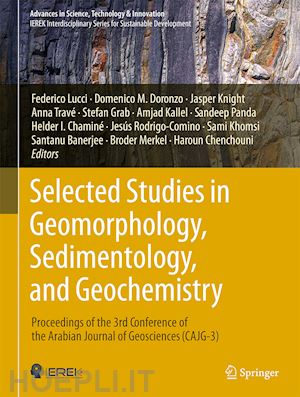

Questo prodotto usufruisce delle SPEDIZIONI GRATIS
selezionando l'opzione Corriere Veloce in fase di ordine.
Pagabile anche con Carta della cultura giovani e del merito, 18App Bonus Cultura e Carta del Docente
This book is based on the papers accepted for presentation during the 3rd Springer Conference of the Arabian Journal of Geosciences (CAJG-3). The book is of interest to all researchers in the fields of geomorphology, sedimentology, and geochemistry. Papers in the field of geomorphology deal with topics related to fault slip and incision rates, soil science, landslides and debris flows, coastal processes, and geoarcheology and geoheritage. Papers in the field of sedimentology cover research studies in stratigraphy and environmental, tectonic, and diagenetic processes, together with studies focusing on the evolutionary, biostratigraphic, and paleo-environmental significance of paleontology. This section also contains papers on marine geosciences, from molecular proxies related to climate to geophysical surveys. The third set of papers focuses on studies related to geochemistry that are focused on sedimentary geochemistry and mineralogical characterization, magmatic and metamorphic processes and products, and the origin and exploration of mineral deposits. This book resumes the current situation related to the abovementioned topics mainly in the Mediterranean realm and its surroundings. The book is of interest to all researchers, practitioners, and students in the fields of geomorphology, sedimentology, and geochemistry.
Federico Lucci:
Dipartimento di Scienze della Terra e Geoambientali, Università degli Studi di Bari Aldo Moro, Italy
Federico Lucci holds a Ph.D. degree in Earth Sciences (2010) from Università degli Studi Roma Tre (Italy). Theses and specialties related to the degrees are petrography, multivariate statistic in Earth Sciences, and igneous petrology-structural geology. Since February 2022, he is Researcher of petrography and petrology at the University of Bari “Aldo Moro”, where he is dealing with the teaching course petrography of metamorphic rocks. Since 2008, he was Co-tutor of numerous bachelor, master, and PhD theses, the bulk of them dealing with the evolution of crystalline basements. Petrographic fieldwork and laboratory activity were always part of the work in each thesis. His research is focused on modelling and timing of magmatic complexes as key constraint for understanding regional tectonics and geodynamic scenarios, through a multidisciplinary approach that integrates field survey, rock fabric characterization, mineral chemistry, geochemistry, geochronology, inverse and forward thermobarometry, and FC-AFC-mixing modeling.
Domenico M. Doronzo:
Istituto Nazionale di Geofisica e Vulcanologia, Italy
Dr. Domenico M. Doronzo holds a B.Sc., a M.Sc., and a Ph.D. degree (in 2011) in Earth Sciences from Università degli Studi di Bari Aldo Moro, Italy. Theses and specialties related to the degrees are physical volcanology, experimental and computational fluid dynamics, petrology, and natural hazards. Then, he has worked in volcanology and sedimentology, fluid dynamics and combustion, environmental sciences, and rock physics in the USA, Mexico, Spain, and Italy. He is currently Contract Researcher at Istituto Nazionale di Geofisica e Vulcanologia, Italy. Particularly, he has received the Rittmann Medal (in 2014) from Associazione Italiana di Vulcanologia and Istituto Nazionale di Geofisica e Vulcanologia,which is assigned to the best young Italian volcanologist. His research interests focus on integrating theory, field, numerical modeling, experiments, and laboratory to study geological processes and products in volcanic areas (Vulcano, Vesuvio, Campi Flegrei, Etna, Colli Albani, Tenerife, Altiplano Puna, Colima) from fluid dynamic and natural hazard perspectives.
Jasper Knight:
University of Witwatersrand, South Africa
Professor of Physical Geography, University of the Witwatersrand, Johannesburg, South Africa.
Professor Jasper Knight is Geoscientist with research interests in the spatial and temporal variability in landscape system responses to climate and environmental changes during the late Pleistocene and Holocene, looking at sediments and geomorphology. Jasper Knight's focus is thematically on glaciers, rivers, coasts, and mountains. Jasper Knight's focus is geographically on the UK and Ireland, northwest USA, Australia, European Alps, various locations in Asia, and across both southern and northern (Saharan) Africa. Jasper Knight is Editor of three major international journals (Sedimentary Geology, Journal of Maps, Land Degradation & Development). Jasper Knight's teaching and student supervision focuses on the interconnections between the physical and human environments, landscape change, and environmental resources of the past, present, and future.
Anna Travé :
Universitat de Barcelona, Barcelona. Spain, Spain
Anna Travé graduated in Geological Sciences in 1987 and received my Ph.D. in 1992 with the thesis stratigraphy, sedimentology, and geochemistry of stromatolites of the South Pyrenean Eocene Basin. During my Ph.D., Anna Travé did three stays in the isotope laboratory in Liverpool (England) as well as other stays in the USA, England, France, and Italy for work meetings. In 1993, Anna Travé participated in a field campaign in the Salt Range (Pakistan) with the UNESCO-INTAS international correlation program “Early Paleogene Benthos”. During 1994 and 1995, Anna Travé had Postdoctoral Position of the European Community at the University of Montpellier where I began my research in the field of fluid circulation and its relationship with tectonics. The last big contracts with companies have been with EXXONMOBIL and Maersk Oil Qatar. From 2011 to 2021, Anna Travé has supervised 7 finished Ph.D. theses.
Stefan Grab:
School of Geography, Archaeology and Environmental Studies, University of the Witwatersrand, South Africa
Stefan Grab is Swiss by birth but grew up in Pietermaritzburg, South Africa. Stefan Grab studied geomorphology at the University of Natal with specialization in periglacial geomorphology. Today, Stefan Grab works in both geomorphology and historical climate change sectors. Stefan Grab's research regions include southern and eastern Africa, the mid-Atlant











Il sito utilizza cookie ed altri strumenti di tracciamento che raccolgono informazioni dal dispositivo dell’utente. Oltre ai cookie tecnici ed analitici aggregati, strettamente necessari per il funzionamento di questo sito web, previo consenso dell’utente possono essere installati cookie di profilazione e marketing e cookie dei social media. Cliccando su “Accetto tutti i cookie” saranno attivate tutte le categorie di cookie. Per accettare solo deterninate categorie di cookie, cliccare invece su “Impostazioni cookie”. Chiudendo il banner o continuando a navigare saranno installati solo cookie tecnici. Per maggiori dettagli, consultare la Cookie Policy.